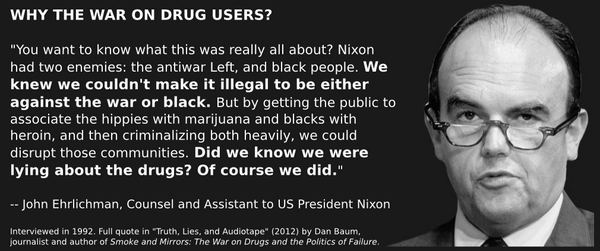Continuing the discussion from Intoxithread:
Making a new thread because that was a topic for fun stuff and this diversion heads into less fun territory.
I think that what was being said here does require a leap, so as I heard it, in my own words:
Drugs are presumably criminalized because habitual drug abuse can have bad side effects. But no one, when asked what they want to be when they grow up, chooses to be a habitual drug abuser so bad off that they steal from their family, can’t hold a job, become a menace to society, etc. etc. That type of life, and whatever underlies it, is not just on a whim for a good time, just on the weekends, or once at a party any more than it is for a cancer patient.
It’s easy for some to say that ‘people chose to use drugs so they chose to be that way and therefore anyone who chooses to use drugs must want to be that way and should be incarcerated’, but people didn’t choose to be that way, and most who choose to use drugs (once at a party) are not likely to end up that way.
People also don’t choose to have cancer, and while some who get it did smoke (or slack on exercise, or work outside in the sun) for many years knowing that may increase the risk, many who get it did not. Anyone can get cancer. You could get it from a stray cellular mutation that happened during a party, or from working in the garden on the weekends, or from a cigar you smoked while celebrating someone’s wedding/childbirth.
So the idea that we should incarcerate anyone who uses drugs kind of does map to the idea that we should incarcerate anyone who gets cancer by ignoring the underlying problems and punishing the wrong things.
At least, that’s my take on it. Not claiming to speak for Russell Brand, or that it’s a great analogy, it’s a stretch. As with any analogy, it has some big holes.
Hole #1: For the analogy to fit, you would need to arrest people for gardening on the weekends, because they might potentially end up with melanoma, not wait until years later once they get cancer to arrest them. Taken to the logical conclusion, you would need to arrest everyone exposed to the sun, cosmic rays, or the earth’s inherent radiation… really anyone who has cells that divide. Because if they’re allowing their cells to reproduce, they might eventually end up with cancer. Just as anyone with drugs might eventually end up as one of those bad drug abusers, but we don’t want to wait until then so we’ll just arrest everyone with drugs. In the analogy, that means arresting everyone with cells.



